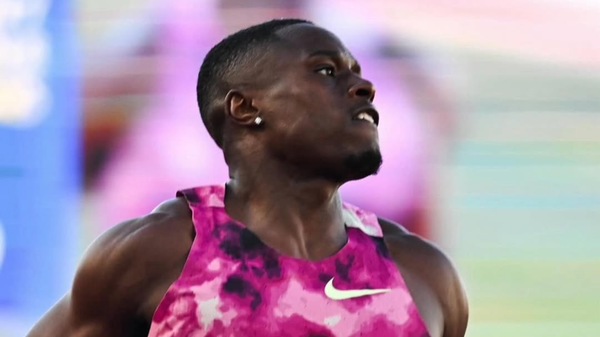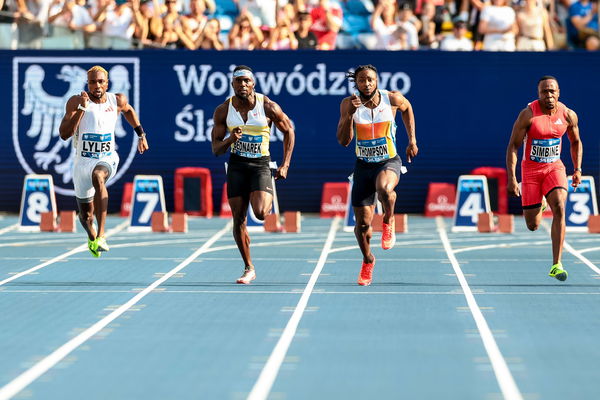
Imago
Credit: IMAGO

Imago
Credit: IMAGO
For years, the Diamond League Final has stood as a rare gateway into the World Championships, offering winners a direct entry that bypassed the usual standards and rankings. Victory in Zurich or Brussels guaranteed a “wild card,” provided a federation had not already filled its four-athlete quota in that event. That rule often shifted rosters at the last minute. With Zurich just days away, however, a new provision has created a fresh opening—one that could prove especially relevant to athletes like Christian Coleman, the U.S. 100-meter specialist who otherwise finds himself on the outside looking in.
Watch What’s Trending Now!
Reports indicate that Coleman will not be participating in the 2025 World Athletics Championships after finishing fifth in the 100-meter final at the U.S. Championships earlier this summer. The placing denied him a direct selection, and with the American quota already stacked, his pathway appeared closed. A recurring hamstring issue, which surfaced repeatedly across the season, only added to his difficulties. Despite showing form in April, inconsistency defined his campaign. The Championships, set for Tokyo from September 13 to 21, seemed destined to unfold without him.

Imago
Credit: Instagram/ Christian Coleman
Yet the addition of a new section to the selection policy has altered the discussion. The document now allows the nomination of reserves in specific circumstances: “The Panel may nominate one additional reserve for any individual event. Such reserve athletes must have achieved the criteria outlined in rounds 3 or 4. If more athletes satisfy the criteria than there are places available, reserve athletes will be named based on the Selection Panel’s consideration of criteria outlined in rounds 3 or 4.”
ADVERTISEMENT
Most importantly, it contains this new rule, “Athletes who receive a wild card by winning the Diamond League series will be selected. If such an athlete has already been selected, the reserve selected in that event will be promoted to the team.”
A new section has been added to the Worlds selection policy, covering reserves. Notably, it allows for an extra athlete to be selected, if there’s a DL win in Zurich. Based on 💎 standings, useful in m100, m800, w200 & w1500 where 4+ have the Q (& athletes Q for Zurich). pic.twitter.com/lGBW3j1rOj
— James Rhodes (@James_Athletics) August 24, 2025
ADVERTISEMENT
This means that if an American already qualified secures the Zurich title, the newly introduced reserve mechanism could open a lane for Coleman. The men’s 100 meters is precisely the kind of event where the policy may be felt most strongly, as multiple U.S. athletes are ranked in contention and several will be in Zurich. Should one of them claim the Diamond League victory, the reserve clause would allow for the promotion of an additional sprinter—an avenue that didn’t existed before.
The language of the policy further underscores its strategic value: “In situations where an athlete has been de-selected, UKA will exercise its sole discretion in determining whether or not to call upon a reserve.” While this was written with British selectors in mind, its principle demonstrates the broader framework being applied in 2025. For Coleman, who appeared definitively shut out after Eugene, the Zurich outcome represents more than another final on the circuit. It is his last, faint opportunity to see Tokyo not as a spectator, but as a competitor.
ADVERTISEMENT
Thus, with championship qualification windows closing on August 24 and national quotas already stretched, the Zurich outcome may not just crown Diamond League champions. It may redraw the final outline of the British team for Tokyo. Alongside this, the wild card system is also waiting to determine how certain athletes entered the Wanda Diamond League Final and what their victories truly meant.
Wild Cards Reshaped Rules and Rewards at the Wanda Diamond League Final
The closing stages of the Wanda Diamond League season often carried a sharper edge because of one curious mechanism: the wild card. While the vast majority of competitors reached the Zurich finale by steadily accumulating points across fourteen meetings, a separate route existed that placed select athletes into the field regardless of their scorecard. This provision shaped the final in ways that altered both the competitive order and the symbolic weight of victory.
ADVERTISEMENT

Imago
Wanda Diamond League meeting in Chorzow Noah Lyles, Kenneth Bednarek, Kishane Thompson, Akani Simbine during athletics Wanda Diamond League meeting in Chorzow, Poland on 16 August, 2025 Chorzow Poland PUBLICATIONxNOTxINxFRA Copyright: xFotoxOlimpikx originalFilename:jastrzebowski-wandadia250816_npWwv.jpg
Global wild cards had been reserved for a maximum of four individuals, two men and two women, chosen by the organizers. Entry required prior participation in at least one series meeting and compliance with strict standards: being a world record holder, a reigning champion at global or Olympic level, or appearing among the top five of an event ranking or the top twenty overall.
As the organizers confirmed, “No competition which already contains a national wild card athlete can also contain a global wild card athlete.” The reward for success carried an unusual twist. A global wild card could indeed lift the Diamond Trophy and the title of champion, but the rules clearly stated that the full share of prize money would not be granted.
ADVERTISEMENT
National wild cards operated under a separate principle. The host federation in Zürich retained the authority to nominate one Swiss athlete per discipline, provided that the individual met a reasonable standard of ability. In this case, the distinction lay in the outcome: should a national wild card win, the competitor would receive the complete prize purse but would not be recognized as the Diamond League champion nor awarded the Trophy. This split between financial gain and symbolic honor underscored the dual purpose of wild cards, allowing organizers to preserve local representation while also safeguarding the integrity of the championship itself.
Top Stories
Cowboys Fire Defensive Coordinator Matt Eberflus: Contract, Salary, NFL Earnings & More

Adam Peaty Faces Gordon Ramsay’s Sly Dig Amid Parents’ Controversial Wedding Absence

Russell Wilson Announces Retirement Stance as Giants QB Shares Hidden Injury News

Marina Mabrey Is Raising Eyebrows Again With Fiery Unrivaled Confrontation

Huge Fire Destroys Over 125-Year-Old Golf Club Designed by 5x Open Winner in London – Report

Dolphins Reportedly Indecisive About Mike McDaniel as GM Search Kicks Off

ADVERTISEMENT
ADVERTISEMENT
ADVERTISEMENT

